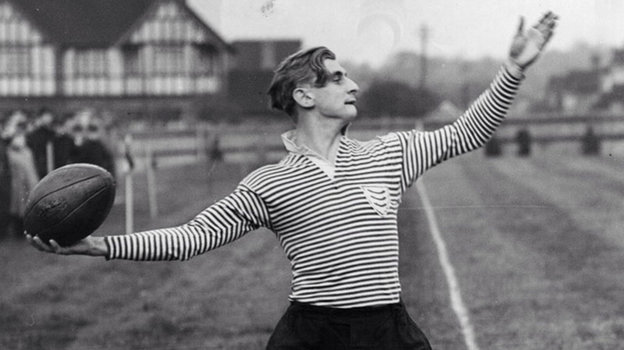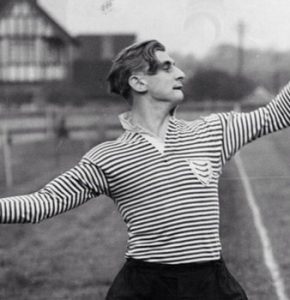
Before each match, he ate a dozen oysters, ran a hundred meters in 10.6 seconds.
The coming to power of the Bolsheviks changed the fate of a huge number of people in the Russian Empire. The hero of this article was no exception. The revolution had an unexpected effect on him – it brought him to rugby.
Start
Prince Alexander Sergeevich Obolensky was born in 1916 in the city that was then called Petrograd. His father was a guards captain. Mother – Princess Lyubov Obolenskaya, nee Naryshkina. Prince Alexander belonged to the most ancient family of Rurikovich. With such a pedigree, the young prince could have a great future in high society. Maybe even shiny. But in 1917 the October Revolution happened. The family had to change plans. When Sasha was only three years old, the family fled to England. The princely family settled in London.
New life
The young Prince Alexander began to receive an education already in England. He first went to an all-boys elementary school in Atwall, then to Trent College, Long Eaton. It was here that he was introduced to rugby and began to make progress in this sport. He played for the main team of this educational institution. Next was the Braiznose College of the University of Oxford. There the prince studied politics, philosophy, and economics. And he continued to play sports.
Eyewitnesses believed that Alexander could succeed in almost any sport. But he made the greatest progress in rugby. He did not forget about his studies. In particular, he wrote an essay for a book called “Oxford in Search of God” about the benefits of serving the king and country. Obolensky received a blue jacket – they were awarded to the most talented athletes at Oxford University. He graduated from the school with a fourth grade diploma.
Career
By that time, the prince was playing rugby not only for the Oxford University team, but for the Leicester Tigers and Rosslyn Park teams. He played so successfully that he was called up to the England national team. The case is truly unique — he was only 19 years old, and he did not even have British citizenship. On February 2, 1936, England hosted New Zealand in London at the Twickenham Arena — the main rugby stadium in England, which still exists and is now the world’s largest purely rugby arena in the world — 82 thousand spectators.
The New Zealanders at that time were already very strong, and the British never defeated them. Nevertheless, England won 13:0. Obolensky scored two attempts, delighting the audience. The first of them is still considered one of the most beautiful in the history of the England team and even in the history of rugby in general. “Obolensky set off at a gallop like a racehorse,” this is how the newsreel announcer spoke about the game of the Russian prince. Alexander ran 3/4 of the field, but none of the All Blacks managed to stop him. I also remember his second attempt, when he played outside the box, moving to the center, and crossed the field diagonally. And again, good speed helped him, no one could stop him.
This match was preceded by a speech by the Prince of Wales, who later became King Edward VIII of Great Britain. He turned to Obolensky: “By what right do you play for England?” “I’m attending Oxford University, sir,” was the reply. In March 1936, Obolensky became a citizen of Great Britain, and the question of the right to play for the English team was removed.
Obolensky continued to play for Leicester. He was still called up to the England squad. In 1936 he played against Wales, Ireland and Scotland. In these games, he did not have effective actions. I went on tour to Argentina with the British Lions team. There is information that in one of the matches he scored 17 attempts, but there is no documentary evidence of this.
He also played for the Barbarians from 1937 to 1939. This is a rugby team, the composition of which is formed in a rather specific way and holds exhibition matches. It includes well-known rugby players from different countries at the invitation of the club’s management. Players from 31 countries have currently played for the Barbarians. Among them was Obolensky. In seven matches, he scored three tries.
Death
The Second World War began, and the prince entered military service. He served with 504 Squadron RAF. He went to war without hesitation. Alexander considered it his duty to fight for the monarch to whom he swore an oath. He wrote to his friend that he received great pleasure from the service and that he liked everything in the army. Alas, death overtook him rather quickly. And not even in combat. The prince died while on a training flight in a Hawker Hurricane fighter. The accident happened while landing.
The plane flew over the entire runway and crashed in a ravine. There was no chance of survival. The day before, the prince received an invitation to the England team for the match against Wales. But he no longer had a chance to play rugby or fight. The Russian prince, who managed to become an English rugby legend, was only 24 years old. Alexander became the first of 14 England players to die during the war.
Memory
Alexander Obolensky was buried in Ipswich. In the same place, on February 18, 2009, a monument to the rugby player was erected. The monument needed 50 thousand pounds. They were collected thanks to donations from individuals and companies. 5,000 pounds donated Russian businessman, owner of the football club “Chelsea” Roman Abramovich.
Source: sport-express.ru


